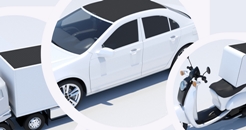 Decarbonising transport
Decarbonising transport
A couple of emerging examples of what you may see in future on the roads and elsewhere:
1. Sunswap
When you see a refrigerated lorry on the road, you may not realise that a diesel engine powers the refrigeration unit. It is estimated there are currently 5.6m refrigeration units on the road globally and this is expected to rise to 8m units.
Operators have been trying to reduce the carbon footprint and emissions but ultimately the industry must stop burning fuel.
Sunswap, a company based in London, have a mission to decarbonise the cold chain with zero-emission Transport Refrigeration Units (TRUs). Funded by government and other sources, the entrepreneurs behind the company have developed innovative products that use solar power and adaptive battery capacity to provide a clean and cost-competitive solution.
They calculate replacing a diesel TRU with a Sunswap TRU could be the equivalent of removing 31 cars from the road.
Sunswap's patent-pending technology provides operators with a zero-emission alternative to their existing diesel TRUs. The original prototype developed in 2020/2021 has successfully proven capability to meet temperature requirements of -22°C. They've been collaborating with six major UK supermarkets on product development.
Now, in agreement with DFDS, Northern Europe’s largest shipping and logistics company, a Sunswap transport refrigeration unit will be deployed in their fleet in early 2022 helping DFDS test a green alternative for their current fleet.
This could also be a very good solution for off-grid mobile cooling in developing economies. Everyday food such as fruits, fish, meat, and vegetables all require refrigeration to ensure that what we eat is fresh and healthy as well as avoiding food waste. FAO (Food and Agricultural Organization of UN) stated that in 2016, 26.7% of the global population was agricultural, meaning that 2 billion people relied on agriculture, fishing, forestry, and hunting for their livelihoods.
This reliance on agriculture, and thus the importance of keeping agricultural and fishery produce fresh, is significantly heavier in developing countries. Currently, there is no sustainable solution that provides off-grid mobile cooling on a mass-scale. The absence of a solution means that farmers and fishermen have no method of keeping produce fresh as soon as it is harvested. This period of storage without refrigeration is a contributor to more than 40% of the food losses occurring at post-harvest and processing levels (FAO).
2. Horizer
Coming out of an accelerator, Horizer is a start-up which has created all-in-one solar mobility solution: flexible ultra-thin solar foils with a battery and accompanying app that can turn any electric vehicle into a solar powered one.
The solar foils can be customized to any vehicle rooftop e.g. car, truck, bus, delivery scooter, etc., and can be installed in under 1 hour.
Good to see such innovation! Perhaps you know of an organisation that can use this? Or maybe it inspires you to innovate and reduce your and other carbon footprints?
Retweet about this article:
Geoff Knott, 23/02/2022